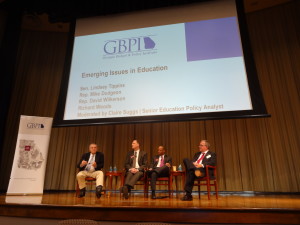State revenues are growing just enough for Georgia to do little more than tread water. Georgia lawmakers need to address hurdles that hinder the state’s schoolchildren, such as lack of funding and early childhood education. And a growing number of states are finding ways to close the health insurance coverage gap through Medicaid expansion.
Those were some of the key points the 170 attendees took away from the GBPI’s tenth annual policy conference, held Jan. 7, 2015 at The Carter Center.

An education panel featuring Sen. Lindsey Tippins, Rep. Mike Dudgeon, Rep. David Wilkerson and state school superintendent-elect Richard Woods prompted their insights into education funding and policy on the eve of the 2015 Georgia General Assembly.
The morning kicked off with an overview of the state’s finances at the outset of 2015, delivered as in past years by GBPI’s Executive Director Alan Essig. This was Essig’s last turn at delivering the annual budget assessment for GBPI. GBPI’s board announced earlier in the week he will step down this spring when he moves to Michigan and Deputy Director Taifa Butler will assume leadership of the organization.
Essig said, based on current growth, the governor’s estimated revenues will likely provide about $900 million in new money for next year’s budget. But he cautioned that $900 million could be quickly used up with routine needs.
“It sounds like a lot of money,” he said. “The school funding shortfall is $750 million. Why can’t you just use all the new revenue for that? If we need $1 billion for transportation, why not put $900 million toward that? I could show you how to spend $900 million in 10 seconds and not accomplish anything new.”
The education panel featuring state leaders followed the budget overview. While the panelists sounded mostly in agreement that the state is obligated to fund schools to help students meet ever-increasing performance standards, they differed on how best to achieve that. But, Tippins said, it’s important this year for lawmakers to address education funding and support early childhood education.
Meanwhile, momentum is building for states to close their health insurance coverage gap through Medicaid expansion and two policy experts used the day’s second panel discussion to explain how and why that is happening. Jason Bailey, director of the Kentucky Center for Economic Policy and Adam Searing, senior research fellow for the Georgetown Center for Children and Families explained how Kentucky and other conservative states are finding ways to close the insurance coverage gap to extend health insurance to people shore up health systems.
Keynote speaker Bob Herbert wrapped up the day with a speech detailing his impressions of the state of the American worker and the country’s infrastructure after researching his book “Losing Our Way: an Intimate Portrait of America.”
He noted that the poor and near-poor make up about a third of the U.S. population and posed the question, “what do we do about all of this? The United States stands for fairness, justice and opportunity for all, but the system falls short of these ideals.”
Butler closed out the conference noting the importance of everyone working together to influence state lawmakers to comprehensively tackle the education, health care, human service and transportation challenges Georgia faces.





